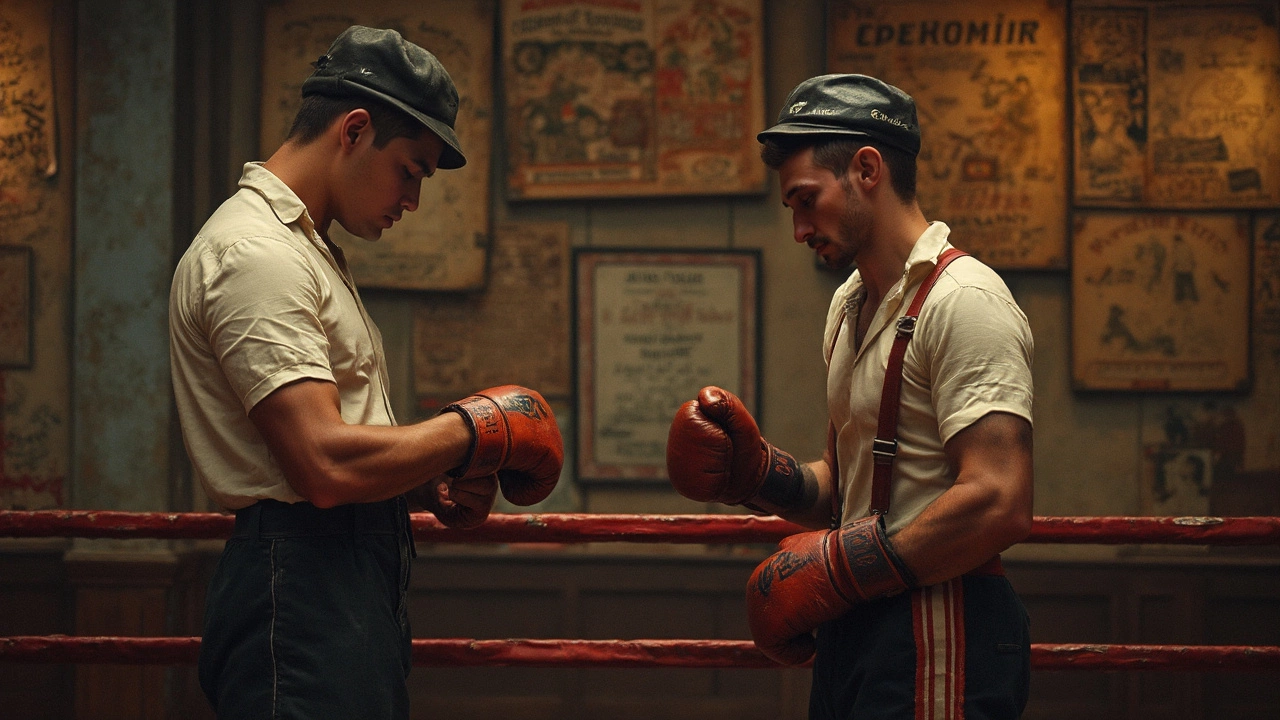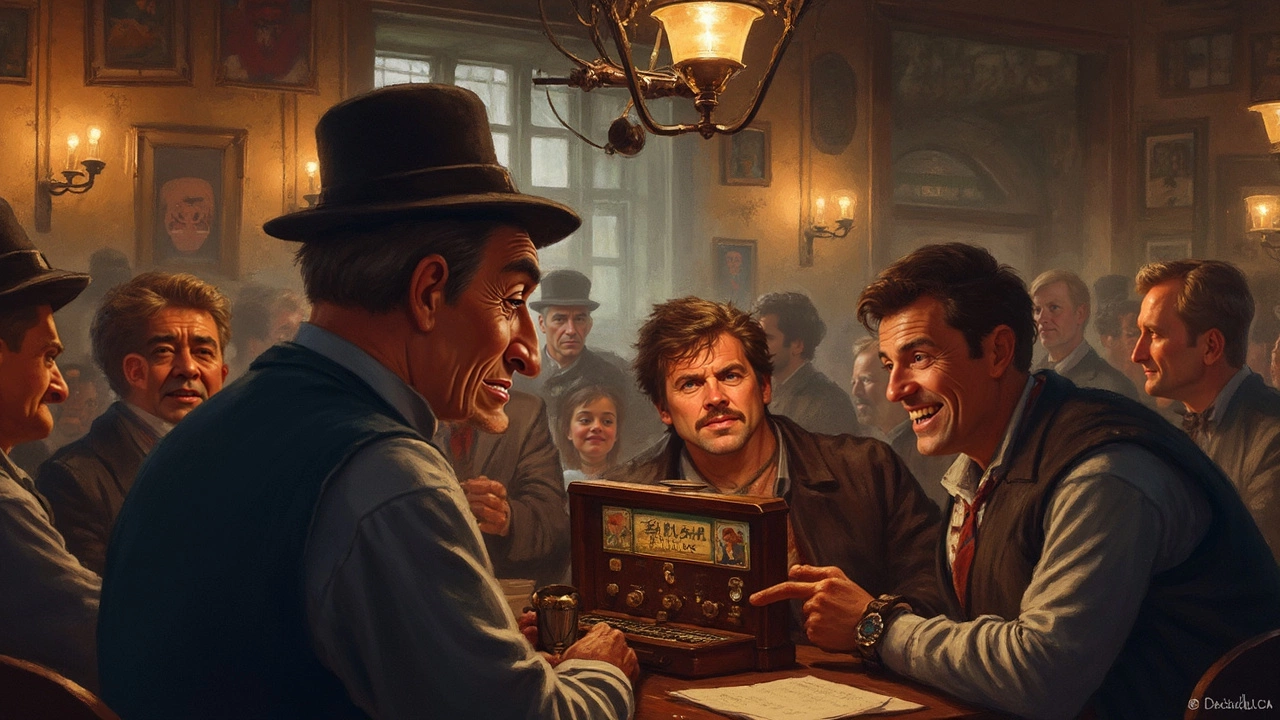Boxing Match vs Boxing Game: Understanding the Difference
 Jun, 26 2025
Jun, 26 2025
Picture a crowded arena on a Saturday night. Lights down, the bell clangs, two fighters tap gloves, every eye glued to the ring. But wait—someone in the crowd leans over and whispers, "Is this called a boxing game or a boxing match?" I’ve actually heard my own kids, Finley and Quinn, debate this one during a fight replay. The language we use in sports isn’t just about words—it’s how we see, feel, and connect to the action, and boxing is a prime example. So why do people sometimes call it a game, and other times a match? Here’s everything you really want to know, along with a few weird facts and tips that’ll make you sound like an insider next time a fight comes up.
Boxing: The Sport and Its Language
Let’s start with the basics. Boxing is a sport where two opponents punch each other inside a square ring. They wear gloves, follow strict rules, and compete round by round. But what do we actually call the contest itself—a game or a match? In most official contexts, it’s a boxing match. Announcers say it. Fighters say it. Even tickets and posters do. This isn’t just about tradition—it says everything about how the world views boxing.
Here’s the thing: when you think about a “game,” what pops into your head? Probably board games, video games, maybe soccer games or baseball games. In most English-speaking countries, we call sports like basketball, football, or tennis “games.” But boxing, wrestling, and tennis (in a different way) use the word “match” more often. Why?
It’s about how the sport works. In team sports, you have a group of people trying to score points or win as a unit. In games, you often play for fun or with a scoring system that’s a bit more casual. In an individual sport like boxing, the focus is one-on-one—two people, no teams, winner takes all. “Match” signals a direct contest: two people matched up in skill, power, and strategy. Even the word “match” comes from the Old French “macher,” meaning ‘to fight’ or ‘to contend’—pretty on the nose, right?
There’s also the vibe of the thing. A “match” feels more serious, higher stakes, more formal. You can play a soccer game with your buddies at the park. You don’t play a boxing match unless you’ve got gloves, rules, and, usually, someone making sure nobody gets seriously hurt.
If you dig deeper—grab any big fight poster, from Muhammad Ali to Tyson Fury—they’ll all use “match” or “bout” (another boxing term for a scheduled fight). Not “game.” The history here matters. Even classic broadcasters like Howard Cosell always said “boxing match” or “the fight.”
Still, language isn’t fixed in stone. In some cases, especially outside English-speaking circles, you’ll catch “game” slip in. Casual fans, folks just learning the sport, or people translating from other languages might mix the two words up. Sometimes video games about boxing—like ‘Fight Night’ or ‘Punch-Out!!’—call themselves “boxing games” because, well, you’re gaming, not actually fighting!

The Rules Behind the Words
Was it always “match” in boxing? Not exactly. Back when the sport was just bare-knuckle brawls in muddy fields, the language was wilder. Old-school write-ups sometimes used “contest,” “set-to,” or even “mill.” As boxing got organized—first with bare fists, then gloves, then the rise of major boxing authorities—the word “match” stuck. The first official rule set, the Marquess of Queensberry Rules (written in 1867), calls it a “match” again and again. No mention of “game” at all.
For clarity, a single event where two fighters face off is called a “boxing match” or a “bout.” If you’re watching an entire evening of fights—say, four or five pairs go one after the other—that’s usually called a “boxing event” or “card.” The night’s main fight? That’s the “main event” or “headline match.”
If you want to really sound like you know your stuff, remember these related words:
- Bout: Interchangeable with “match,” usually used for any one-on-one contest.
- Fight: The general term everyone understands, covers both pro and amateur.
- Contest: Sometimes pops up in official documents, meaning the same thing as “match.”
Now, let’s talk about the tip of the iceberg that gets parents debating at the dinner table: is there such a thing as a “boxing game”? Not really, if you mean a real-world fight. The confusion is natural—since fans say “game” in so many other sports—but in boxing, “match” is correct unless you’re holding a video game controller.
But here’s something that trips up a lot of English learners and even native speakers: why do we say “boxing is a sport,” “playing a football game,” “winning a boxing match”? It’s a cultural thing. Traditionally, you “play” games but you “fight,” “win,” or “lose” matches. Tennis and wrestling have their own quirks, too (think: “tennis match” but “football game”). It’s all about how the events were created, how points work, and how players compete. In boxing, you’re not “playing,” you’re fighting. That’s the key difference in everyday talk.
Even among boxers themselves, calling it anything but a “match” or a “fight” seems pretty weird. Ask someone who’s done a few amateur bouts—they’ll give you a side-eye if you ask, “So did you win your boxing game?”
There are some modern twists, though. In places where English is not the first language, folks might casually say “game” just because the English word is easier for them to remember. But the deeper you get into the sport, the more “match” dominates the lingo, from gyms to TV broadcasts to ringside interviews.

Fun Facts and Insider Tips for Boxing Newbies
Boxing isn’t just about the hits and highlights—it’s a sport loaded with traditions and unusual facts. First, here’s a stumper that always gets a laugh in my house: the boxing ring is actually square, not round. Those are just the weird kind of details that keep the old terms alive.
- Did you know the term “pound for pound” started in boxing? It means judging fighters no matter their weight class—telling you who’s really the best, regardless of size. Sugar Ray Robinson is considered one of the best pound-for-pound boxers ever.
- “Throwing in the towel” comes straight from boxing. When a trainer knows their fighter’s had enough, they toss a towel into the ring to stop the match. Now people use it for anything, from quitting a board game that’s gone bad to finally giving up on assembling flat-packed furniture.
- Ring walks are a huge part of the show. The most famous ones? Muhammad Ali’s dance into the ring, or when Floyd Mayweather brought Justin Bieber and Lil Wayne to hype his entrance. Not a thing in any “boxing game” you’ll watch, but unforgettable at a real match.
If you’re looking for tips, don’t just memorize terms—watch how different sports talk about themselves. Fencing? Always a “match.” Chess, too. If you call chess a “game,” you’re not wrong, but the professional side calls it a “match” when the stakes are high. In boxing, stick to “match” and “bout.” For the right context, “fight” always works, but never “game”—unless you're talking about watching someone box on PlayStation, and even then, you’re playing a “boxing video game.”
Kids ask the funniest questions, honestly. Mine once wanted to know if the fighters in a match had to play against themselves in a boxing game like you do against computer bots. It’s a fair point—“game” in modern speech has lost some of its seriousness. Boxing is still seen as the ultimate test: brutal, technical, dangerous, and athletic all at once. That’s why people lean into “match”—it carries a lot of weight. You hear “world championship boxing match,” never “game.” World titles are at stake, not just a fun time.
- If you want to learn more, check out official organizations like USA Boxing or the International Boxing Association. Their websites are full of handy glossaries, rules, event calendars, and almost never use “game” for a real-life match. Even Wikipedia gets this one right.
- Pro tip: next time you’re watching with someone who loves other sports, throw out a fact like, “Did you know a single evening of boxing is called a ‘card’ or ‘event’, but each pair of fighters compete in a ‘match’ or ‘bout’?” Instant expert points.
It’s not just trivia. The language shapes how you respect the sport. Calling it a boxing game feels a little off, like calling a marathon a “jog.” If you want to sound like you belong ringside—or just look smarter than the average person at a fight party—say “match.” It tells the world you know that boxing isn’t just a contest for points. It’s a hard-fought struggle, with roots that go all the way back to the ancient Greeks. Game on? No—the match is on.